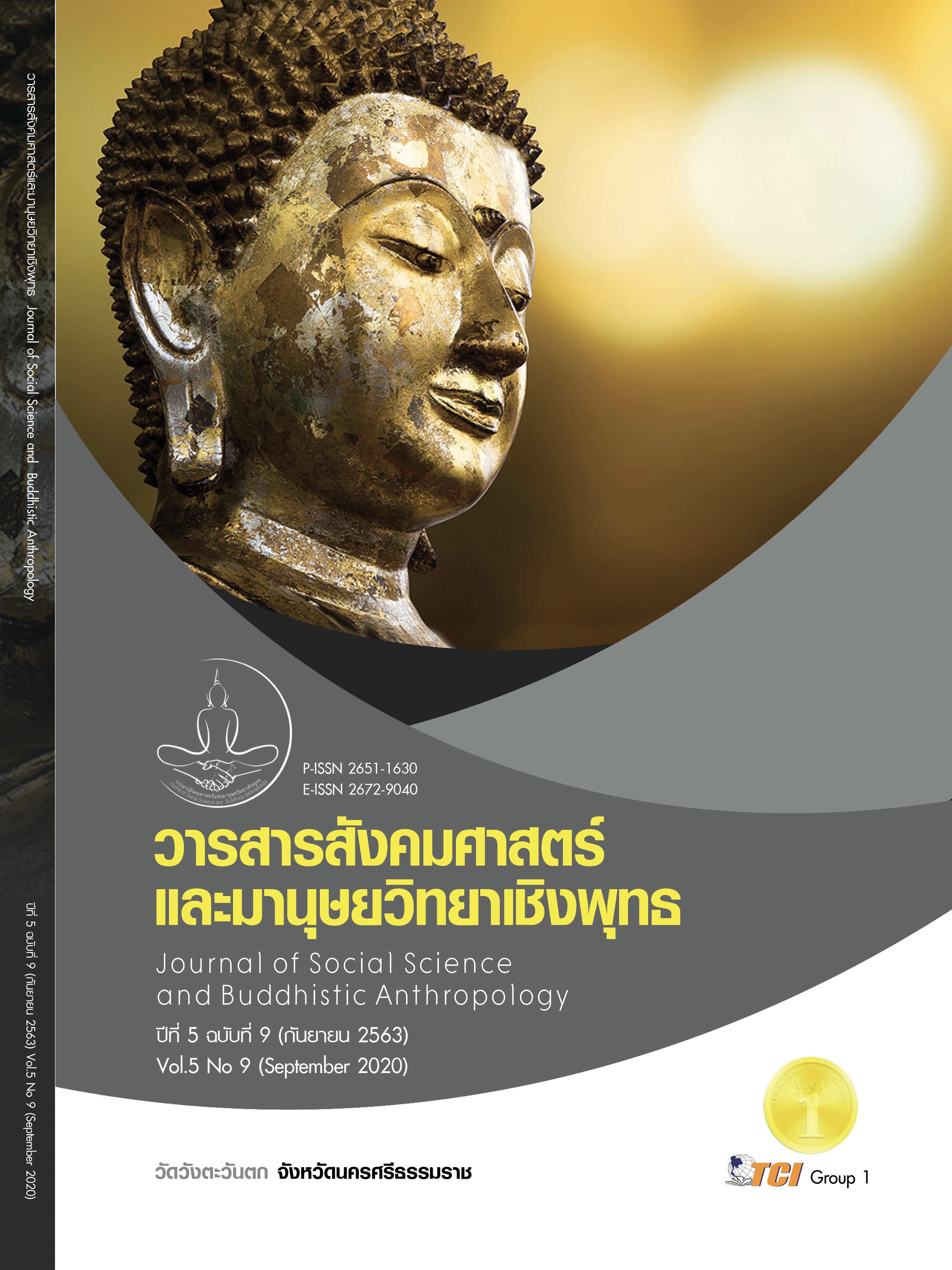COMPETENCY DEVELOPMENT STRATEGY OF BASIC EDUCATION SCHOOL DIRECTOR IN EDUCATION 4.0
Keywords:
Competency Development, Strategy of Basic Education School Administrators, Education 4.0Abstract
The objectives of research were: 1) study the components of the competency of basic education School Director in Education 4.0, 2) study the current situation and needs for competency development of Basic Education school administrators in Education 4.0 and 3) or competency development of Basic Education school administrators in Education 4.0. The mixed method research was employed. Quantitative research the sample group consisted of elementary school administrators. Under the Office of the Basic Education Commission, consisting of 314 people in the 6 regional inspection areas, academic year 2018, the research instrument was a qualitative research questionnaire the key informants are school administrators who perform best. Regarding the royal school of 7 persons, data were collected through in-depth interviews. Data were analyzed using descriptive statistics such as mean, percentage, standard deviation. And data synthesis by content analysis method the results of the research revealed that 1) The composition of the basic educational institution administrators' competency in the education era 4.0 consists of 4 aspects which are 1.1) characteristics 1.2) new age skills 1.3) academic leadership and 1.4) morality and ethics. 2) Nowadays, the strengths are moral courage. Ethics and code of ethics, etc., and the need to find that the most needed development is the use of media and information technology in school management. 3. The strategies for competency development of Basic Education school administrators in Education 4.0 consisted of 6 areas including 3.1)promoting the use of ICT among school administrators for institutional development, 3.2)developing English for communication and acquiring new knowledge, 3.3)optimizing the effectiveness of innovative management of school administrators for systematic institutional development, 3.4) supporting the potential of transformative leadership, 3.5)promoting the effectiveness of academic management of school administrators, and 3.6) developing school administrators to employ institutional management process based on good governance.
References
กระทรวงศึกษาธิการ. (2552). หลักสูตรแกนกลางการศึกษาขั้นพื้นฐาน พุทธศักราช 2551. กรุงเทพมหานคร: โรงพิมพ์ชุมนุมสหกรณ์การเกษตรแห่งประเทศ.
ชัยยนต์ เพาพาน. (2558). แนวคิดและทฤษฎีพื้นฐานการเป็นผู้นำของผู้บริหารสถานศึกษาในศตวรรษที่ 21 คณะครุศาสตร์ มหาวิทยาลัยราชภัฎกาฬสินธุ์. วารสารบริหารการศึกษา คณะศึกษาศาสตร์ มหาวิทยาลัยขอนแก่น, 12(1), 1-9.
ชัยเสฎฐ์ พรหมศรี. (2548). การบริหารจัดการแบบมืออาชีพ. กรุงเทพมหานคร: บุ๊คแบงก์.
ธีระ รุญเจริญ. (2544). สภาพและปัญหาการบริหารและการจัดการศึกษาขั้นพื้นฐานของสถานศึกษาในประเทศไทย. กรุงเทพมหานคร: สำนักงานคณะกรรมการการศึกษาแห่งชาติ สำนักนายกรัฐมนตรี.
นิพนธ์ ศุขปรีดี. (2545). นวัตกรรม เทคโนโลยี สื่อสารการศึกษา. กรุงเทพมหานคร: นีลนาราการพิมพ์.
นุชนรา รัตนะศิระประภา. (2557). สมรรถนะของผู้บริหารที่ส่งผลต่อคุณลักษณะโรงเรียนมาตรฐานสากล สังกัดสำนักงานคณะกรรมการการศึกษาขั้นพื้นฐาน. วารสารวิชาการ Veridian E - Journal, 7(3), 507 – 528.
บรรลุ ชินน้ำพอง และวัลลภา อารีรัตน์. (2556). สมรรถนะของผู้บริหารสถานศึกษาที่ส่งผลต่อประสิทธิผลของโรงเรียนสังกัดองค์การบริหารส่วนจังหวัดขอนแก่น. วารสารศึกษาศาสตร์ ฉบับวิจัยบัณฑิตศึกษา, 7(1), 92-103.
บุญเลิศ วีระพรกานต์. (2553). นวัตกรรมเพื่อการบริหารสถานศึกษา. เรียกใช้เมื่อ 20 สิงหาคม 2561 จาก https://www.gotoknow.org/posts/342911
ประพจน์ แย้มทิม. (2545). ยุทธศาสตร์การบริหารสถานศึกษาให้ประสบความสำเร็จ. วารสารบริหารการศึกษา มหาวิทยาลัยศรีนครินทรวิโรฒประสานมิตร, 34(3), 34 – 35.
พิชิต เทพวรรณ์. (2555). A-Z เครื่องมือการจัดการทรัพยากรมนุษย์สมัยใหม่. กรุงเทพมหานคร: ซีเอ็ดยูเคชัน.
ภคินี มีวารา. (2559). สมรรถนะผู้บริหารโรงเรียนสังกัดสานักงานเขตพื้นที่การศึกษาประถมศึกษาอ่างทอง ตามมาตรฐานวิชาชีพของคุรุสภา. เรียกใช้เมื่อ 28 สิงหาคม 2561 จาก http://www.edu-journal.ru.ac.th/index.php/abstractData /viewIndex/348.ru.
วิจารณ์ พานิช. (2546). องค์การแห่งการเรียนรู้และการจัดความรู้. เรียกใช้เมื่อ 17 กรกฎาคม 2554 จาก http://www.ha.or.th/km.html.
วิมลรัตน์ ศรีสำอางค์. (2558). สมรรถนะหลักทางการบริหารสำหรับผู้บริหารสถานศึกษาตามความคิดเห็นของครูในโรงเรียนมัธยมศึกษา จังหวัดนครพนม. วารสารมหาวิทยาลัยนครพนม, 5(2), 80-89.
สมชาย พวงโต. (2560). รูปแบบการพัฒนาภาวะผู้นําทางวิชาการของศึกษานิเทศก์ สังกัดสํานักงานคณะกรรมการการศึกษาขั้นพื้นฐาน. วารสารครุศาสตร์ปริทรรศน์, 4(2), 22 - 30.
สำนักงานคณะกรรมการข้าราชการครูและบุคลากรทางการศึกษา. (2548). ประกาศสำนักงาน ก.ค.ศ. เรื่องมาตรฐานตำแหน่งข้าราชการครูและบุคลากรทางการศึกษา. กรุงเทพมหานคร: สำนักงานคณะกรรมการข้าราชการครูและบุคลากรทางการศึกษา.
สำนักงานเลขาธิการสภาการศึกษา. (2553). ข้อเสนอการปฏิรูปการศึกษาในทศวรรษที่ 2 (พ.ศ. 2552-2561). กรุงเทพมหานคร: พริกหวานกราฟฟิค.
สุบัน มุขธระโกษา และคณะ. (2561). ความเป็นมืออาชีพของผู้บริหารสถานศึกษายุคไทยแลนด์ 4.0 . วารสารวิชาการสถาบันเทคโนโลยีแห่งสุวรรณภูมิ (สาขามนุษยศาสตร์และสังคมศาสตร์), 4(2), 453-461.
สุรศักดิ์ ศุภเมธีวรกุล. (2557). รูปแบบการพัฒนาสมรรถนะผู้นำการเปลี่ยนแปลงสู่ความเป็นเลิศตามมาตรฐานสากลในการบริหารสถานศึกษาขั้นพื้นฐาน สังกัดสำนักงานคณะกรรมการการศึกษาขั้นพื้นฐาน. ใน วิทยานิพนธ์ศึกษาศาสตร์ดุษฎีบัณฑิต สาขาการจัดการการศึกษา. วิทยาลัยครุศาสตร์ มหาวิทยาลัยธุรกิจบัณฑิตย์.
สุรีพร โพธิ์ภักดี. (2558). สมรรถนะการบริหารงานของผู้บริหารโรงเรียน ตามทัศนะของครูสังกัดสำนักงานเขตพื้นที่การศึกษามัธยมศึกษา เขต 12. วารสารเทคโนโลยีภาคใต้, 8(1), 47-54.
Fullan, M. (2006). The New Meaning of Education Change. London: Routledge/Falmer.
Hoy, W. K. & Miskel, C. G. . (2001). Educational Administration: Theory, Research, and Practice. (6th ed.). New York: McGraw-Hill.
Wilson, R. C. (2002). Education for Gifted. Chicago: The University of Chicago Press.









